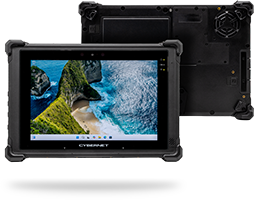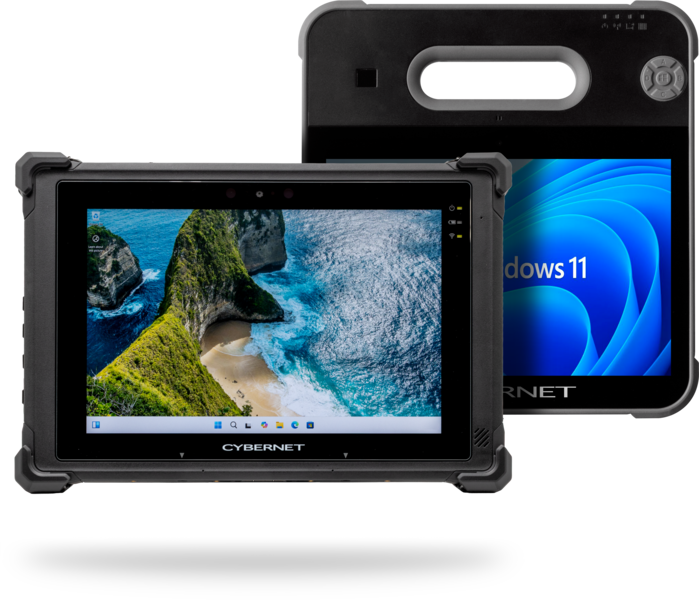It used to be that customers could only pay for goods or services at a specific store counter. Now, Point of Sales (POS) is digital, allowing purchases to be done wherever the customer is located. Learn how this is done, its benefits, and how to pick the right industrial computers or tablets for your POS system.
- What is a POS System?
- Types of POS Systems
- Benefits of POS Computer Systems
- Selecting POS Computer Systems: What to Look For
What is a POS System?
Point of Sales is where the customer pays for goods or services. This may be at a physical place, like a brick-and-mortar store, or virtual, like a website, or through smartphones and tablets.
POS systems today use a combination of hardware and software. Hardware includes barcode scanners, card readers, cash registers, receipt printers, tablets, and touchscreens. They work with Customer Relationship Management (CRM) software and similar systems to complete sales. Many also manage customer data, generate reports, and track inventory.
Types of POS Systems
IBM debuted the first computerized cash register in the 1970s. They've come a long way since then, thanks to advances in technology. Today's POS systems fall under one of three types.
Traditional POS systems
Also known as legacy systems, traditional POS systems are found in brick-and-mortar buildings like retail shops, restaurants, and supermarkets. They come in fixed setups, such as desktop POSs, cash registers, receipt printers, etc. Onsite employees usually operate them.
Self-service and kiosk POS systems can also be found in such places, as well as movie theaters and airports. Unlike traditional setups, employees rarely staff them. Instead, customers scan and pay for purchases on their own.
Mobility-based POS
Mobile point-of-sales systems process sales using tablets and smartphones. This allows businesses to complete transactions virtually anywhere there's a Wi-Fi connection.
Small businesses, food trucks, and venues like outdoor craft fairs and concerts use mobile POS systems.
Cloud-based POS
Cloud-based POS systems process sales transactions online. They are primarily accessed through web pages or Internet apps. Shoppers thus don't need to go to a physical location, a kiosk, or meet with vendors in person to make purchases.
Unsurprisingly, web stores and similar businesses are the main users of this point-of-sale system. Traditional and mobile-based POS systems can also be set up to run on the cloud, doing everything from data storage to sending receipts.
Benefits of POS Computer Systems
Today's POS computer systems can do far more than just process payments. With the proper setup, they can:
- Handle routine operations - POS computers can analyze customer data for trends like buying habits. They can print out invoices and schedule employee work shifts. These features and more frees business owners and staff to provide better customer service and experience.
- Manage Inventory - Automatically track goods as they're sold. This reduces the need for inventory audits.
- Make checkout faster - Self-service POS and kiosk systems allow customers to pay for purchases. This makes checkouts faster while reducing the need for additional cashiers.
- Reduce expansion costs - Businesses using cloud-based POS systems running Software as a Service (SaaS) will find expanding operations across many stores easier and less expensive.
- Process different kinds of payment - Today's customers have other ways to pay besides cash: cards, digital wallets, and mobile payment apps (Venmo, Zelle) to name just a few. POS systems can be configured to handle them and future forms of payment like cryptocurrency. Businesses never have to turn away customers because they can't process their payments.
Selecting POS Computer Systems: What to Look For
Decided a point-of-sale system is right for you and your company? Here's a checklist on how to pick the best POS computer, along with recommendations.
Is it within the budget?
POS systems vary in cost. For example, because of all their hardware, traditional onsite systems are more expensive than one running on an industrial tablet with a card reader. On the other hand, upgrading CRM software on the cloud is less expensive than updating each system's software individually.
You'll want to weigh which combination of types, computers, and features best fits your budget.
Does it have all the key features?
The best POS computer runs the way you want. Does it connect to the onsite network or the cloud? Is it registering the correct price from the barcode scanner? Are the inventory numbers correct?
One way to answer these questions is the use of demo models. Ask your computer manufacturer if they offer them. You can then bring back to your place(s) of business and run through their paces.
What's its reliability?
The last thing any vendor wants is to tell customers they can't take their money because their POS system is down.
Ask POS system sellers about the failure rate of their products. And if it does break down, what are their warranties? Also, check if their help desk is staffed with employees familiar with the system or outsourced to a third party.
How is the security?
Legitimate vendors protect themselves and customers' info through the Payment Card Industry Data Security Standard and similar security standards.
Ask POS system sellers about the security of their computers. For example, built-in RFID and fingerprint readers ensure that only those you approve can see vital customer data and bank information.
Is it built for my industry?
Finally, ensure the POS computer can handle issues unique to your business. Does your staff process sales in a hospital? Check that your computers and tablets are medical-grade protection for nearby patients and medical devices. Is the area rough at the point of sale, like at a construction site or even a park? Consider an industrial panel PC with a rugged build. It's built to withstand frequent drops and hazards like clouds of dust.
Equipment sellers who are Original Equipment Manufacturers (OEM) can help you best since they know their computers inside and out.
Maximize Sales through Cybernet POS Computers
The days of paying for goods and services at the designated counter are long gone. Today, point of sales can be done almost anywhere, thanks to computers and the cloud. Businesses can do even more as POS systems also track inventory, look for trends, and manage employee shifts, to name a few.
The right computer can make the difference between a good sale and a great one. Contact Cybernet Manufacturing to find the right one for your POS system. We have models pre-built for the major industries (healthcare, industrial, and enterprise) and their specific needs. And if none are exactly what you're looking for, it's not a problem. As an OEM, we have complete control of our computers. We're confident we can build the best point of sale computer to meet your exact system wants and needs.

